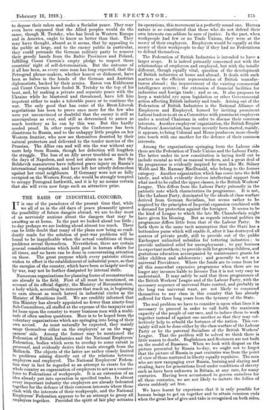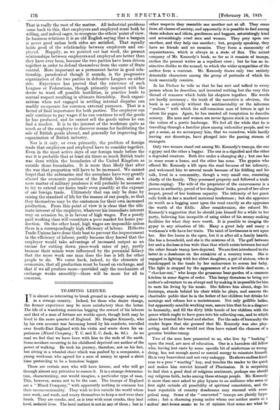THE BASIS OF INDUSTRIAL CONCORD.
IT is one of the paradoxes of the present time that, while we all of us in the old days of peace pleasantly ignored the possibility of future dangers abroad, we are to-day most of us nervously anxious about the dangers that may be awaiting us at home. In the past we looked ahead too little ; to-day perhaps we are looking ahead almost too much. There can be little doubt that many of the plans now being so confi- dently made for the solution of post-war problems will be found to be inapplicable when the actual conditions of those problems reveal themselves. Nevertheless, there are certain general considerations which hold good in human affairs for all times, and no harm can be done in concentrating attention on these. The great purpose which every patriotic citizen wishes to effect is the establishment of industrial peace, so that the energies of the country, which have been so largely used up by war, may not be further dissipated by internal strife.
Numerous organizations for planning forms of reconstruction are already in the field. First of all must be mentioned, on account of its official dignity, the Ministry of Reconstruction, a body which, according to rumours that reach us, is beginning to earn almost as much hatred in industrial circles as the Ministry of Munitions itself. We are credibly informed that this Ministry has already appointed no fewer than ninety-four Sub-Committees, all staffed at the expense of the taxpayer and let loose upon the country to worry business men with a multi- tude of often useless questions. More is to be hoped from the voluntary organizations which are springing into being of their own accord. As must naturally be expected, they mainly range themselves either on the employers' or on the wage- earners' side. Among the former may be mentioned the Federation of British Industries and the National Employers' Federation, bodies which seem to overlap to some extent in personnel, and evidently derive their main strength from the Midlands. The objects of the latter are rather closely limited to problems arising directly out of the relations between employers and employed. The National Employers' Federa- tion may in fact be regarded as an attempt to create for the whole country an organization of employers to act as a counter- force to Federations of workpeople. It is an extension of an idea already put into operation in specified trades. In almost every important industry the employers are already federated together for the defence of their common interests where those clash with the interests of their workpeople, and the. National Employers' Federation appears to be an attempt to group all employers together. Provided the spirit of fair play actuates its operations, this movement is a perfectly sound one. Human nature is so constituted that those who do not defend their own interests can seldom be sure of justice. In the past, when workpeople had few or no Trade Unions, they were at the mercy of their employers. Employers would be equally at the mercy of their workpeople to-day if they had no Federations to defend themselves.
The Federation of British Industries is intended to have a larger scope. It is indeed primarily concerned not with the relationships of employers and employed, but with the totally different, though equally vital, question of the development of British industries at home and abroad. It deals with such matters as the efficient representation of British manufac- turers abroad ; the improvement of the existing commercial intelligence system ; the extension of financial facilities for industries and foreign trade ; and so on. It also proposes to keep a watchful eye upon legislation or other Governmental action affecting British industry and trade. Arising out of the Federation of British Industries is the National Alliance of Employers and Employed, formed by inviting prominent Labour leaders to sit on a Committee with prominent employers under a neutral Chairman in order to discuss their common interests. Another employers' organization, the British Empire Producers' Association, has more recently been started, mainly. it appears, to bring Colonial and Home producers more closely into touch with one another for the defence of their common interests.
Among the organizations springing from the Labour side there are the Federation of Trade Unions and the Labour Party.
The latter under its new constitution is laying itself out to include mental as well as manual workers, and a great deal of its programme is evidently inspired by men like Mr. Sidney Webb and Mr. Ramsay MacDonald, who belong to the former category. Another organization which has come into the field lately, and which evidently derives intellectual support from what used to be called the upper classes, is the British Workers* League. This differs from the Labour Party primarily in the patriotic note which characterizes its programme. It is not, like the Labour Party, dominated by the ideals of class warfare derived from German Socialism, but seems rather to be inspired by the principles of Imperial expansion combined with a demand for protection against the foreigner. It seems to be the kind of League to which the late Mr. Chamberlain might have given his blessing. But as regards internal politics its programme differs little from that of the Labour Party. In both there is the same tacit assumption that the State has a bottomless purse which will enable it, after it has destroyed all sources of private profit, still to provide out of the public Exchequer unlimited subsidies for tottering industries ; to provide unlimited relief for unemployment ; to pay bonuses to expectant mothers ; to provide milk for growing children, and gratuitous education accompanied by maintenance grants for older children and adolescents ; and generally to act as a universal Providence. Where the funds are to come from for all this somewhat expensive programme when there are no longer any incomes liable to Income Tax it is not very easy to understand. It may safely be said that these programmes of the British Workers' League and of the Labour Party, with the necessary sequence of universal State control, and probably in the long run universal want, are not likely to commend themselves to any class in this country that has already suffered for three long years from the tyranny of the State.
The real problem we have to consider is upon what lines it is necessary to proceed in order to call forth the maximum capacity of the people of our race, and to induce them to work together instead of against one another so that they may col- lectively help to rebuild the fortunes of the nation. This cer- tainly will not be done either by the class warfare of the Labour Party or by the paternal Socialism of the British Workers' League. That the problem will be solved we think there is little reason to doubt. Englishmen and Scotsmen are not built on the model of Russians. When we look with disgust on the picture presented by Russia to-day, we ought not to forget that the picture of Russia in past centuries was from the point of view of those nurtured in liberty equally repulsive. The men who are now rampaging over Russia, burning and slaying and stealing, have for generations lived under conditions of slavery such as have been unknown in Britain, at any rate, for many centuries. Having been accustomed to govern ourselves for all these centuries, we are not likely to imitate the follies of slaves suddenly set free.
We have learnt by experience that it is only possible for human beings to get on together and to attain common ends when the great law of give-and-take is recognized on both sides. That bere,ally the root of the matter. All industrial problems come back to this, that employers and employed must both be willing, and indeed eager, to recognize the others' point of view. In business relations it is an old English saying that a bargain is never good unless both sides are satisfied. That equally holds good of -the relationship between employers and em- ployed. Happily, as we pointed out last week, the present relationships between employers and employed are better than they have ever been, because the two parties have been driven together in order to defend themselves from the curse of State control. More important as a permanent factor in good rela- tionship, paradoxical though it sounds, is the progressive organization of the two parties in defensive Leagues on either side. Experience has proved that the existence of such Leagues or Federations, though primarily inspired with the desire to ward off possible hostilities, in practice leads to mutual respect resulting in ultimate friendship. Such organi- zations when not engaged in -settling internal disputes can readily co-operate for common external purposes. That is a factor of final importance for both parties. The employer can only continue to pay wages if he can continue to sell the goods he has produced, and he cannot sell the goods unless he can find a market. It is to the interest of the workman quite as much as of the employer to discover means for facilitating the sale of British goods abroad, and generally for improving the organization of British industry.
Nor is it only, or even primarily, the problem of foreign trade that employers and employed have to consider together. Even in the most active days of our foreign trade before the war it is probable that at least six times as much British trade was done within the boundaries of the United Kingdom as outside those boundaries. It is more than likely that after the war that proportion will have to be increased. We cannot forget that the submarine and the aeroplane have very greatly altered the economic position of the British Isles, and as a mere matter of military prudence it will probably be necessary to try to extend our home trade even possibly at the expense of our foreign trade. Ultimately that can only be done by raising the standard of life for the masses of our people, so'that they themselves may be the customers for their own increased production. From this point of view it is clear that the ulti- mate interest of the employer, whatever:his immediate interest may on occasion be, is in favour of high wages. For a poorly paid working class will constitute a poor market for home pro- duction. On the other hand, high wages are impossible unless there is a correspondingly high efficiency of labour. Hitherto Trade Unions have done their best to prevent the improvement in the efficiency oflabour, partly because they feared that the employer would take avantage of increased output -8,8 an excuse for cutting down piece-work rates of pay, partly because their minds were influenced by the perennial fallacy that the more work one man does the less is left for other people to do. We come baok, indeed, to the -elements of economics, that all production must be based on exchange, and that if we all'produce more—provided only the mechanism of exchange works smoothly—there will be more for all to consume.



























 Previous page
Previous page